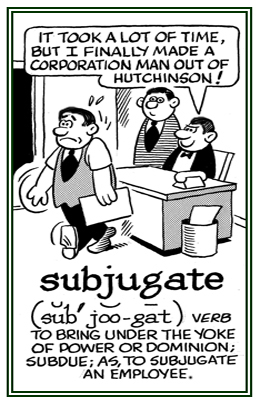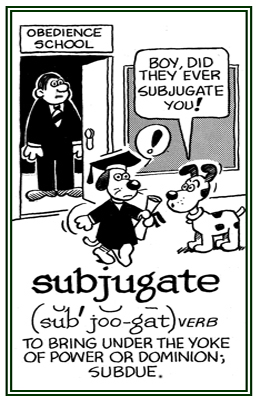sub-, suc-, suf-, sug-, sum-, sup-, sur-, sus-, su-
(Latin: under, below, beneath; used as a prefix as shown in various formats below)
The prefix sub- often becomes suc- before c: succumb.
The prefix sub- often becomes suf- before f: suffuse.
The prefix sub- often becomes sug- before g: suggest.
The prefix sub- often becomes sum- before m: sumptuous.
The prefix sub- often becomes sup- before p: suppression.
The prefix sub- often becomes sur- before r: surrogate.
The prefix, sub- is often simplified to su- before sp; as seen in suspect, suspend, suspicion, suspension, et al. Before c, p, and t; it is sometimes formed into sus-.
2. To bring under control; to conquer; to defeat: Ron is determined to subjugate his temper and to develop a more tolerant attitude towards those who disagree with him.
3. To make subservient or to enslave: It does not make for a healthy relationship when someone attempts to subjugate another person.
4. To put down by force or intimidation: The king subjugated his enemies and was able to assert his power in all parts of the empire.
5. Etymology: from Late Latin subjugationem and subjugatio; from Latin subjugatus and subjugare, "to subdue"; literally, "to bring under a yoke", from sub-, "under" + jugum, "yoke", related to iungere, "to join".


Go to this Word A Day Revisited Index
so you can see more of Mickey Bach's cartoons.
2. In grammar, denoting or pertaining to the mood of a verb that marks a statement or question; such as, hypothetical, doubtful, or grammatically subordinate; for example, "were" in "if I were you".
3. Etymology: "a gramatical mood of a verb to denote an action or state as conceived and not as a fact"; from Late Latin subjunctivus, "serving to join, connecting", from the stem of subjungere, "to append, to add at the end, to place under"; from sub-, "under" + jungere, "to join".
The form were is used in clauses introduced by if, as if, as though, or supposing, as in:
- If you were to go, you might not be allowed to return.
- It's not as though she were a beauty queen.
- Suppose I were to meet you in the restaurant after the show.
The subjunctive also occurs in fixed expressions; such as, as it were, be that as it may, come what may, and far be it from me.
2. To divert the energy associated with an unacceptable impulse or drive into a personally and socially acceptable activity.
2. So awe-inspiringly beautiful as to seem almost heavenly.
3. Etymology: borrowed from Latin sublimis, "lofty, exalted".
This was a compound adjective formed from the prefix sub-, "under" and probably limen, "lintel" (horizontal beam that supports the weight of the wall above a window or door), "threshold"; a relative of limes, "boundary", from which English acquired "limit".
2. Inadequate to produce conscious awareness but able to evoke a response.
3. Entering, existing in, or affecting the mind without conscious awareness.
2. A sublingual part, such as a gland, artery, or duct.
3. Placed under the tongue; a reference to medicines that are administered by being placed under the tongue to dissolve.
2. Of or belonging to this world; earthly, terrestrial.
Beginning with the moon, up to the limits of the universe, everything is made of ether.


